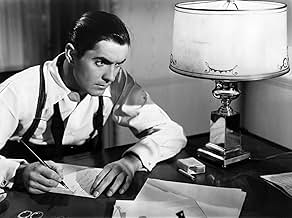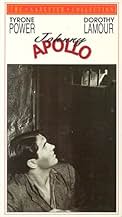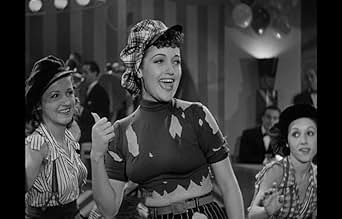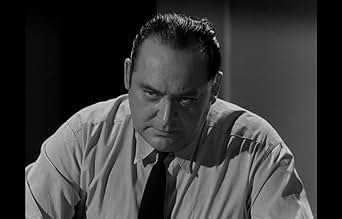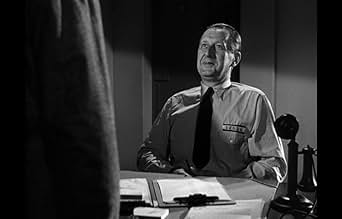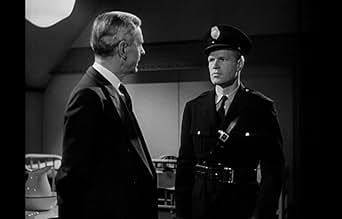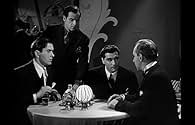IMDb RATING
6.9/10
1.6K
YOUR RATING
The son of a jailed Wall Street broker turns to crime to pay for his father's release.The son of a jailed Wall Street broker turns to crime to pay for his father's release.The son of a jailed Wall Street broker turns to crime to pay for his father's release.
- Awards
- 2 wins total
Selmer Jackson
- Warden
- (as Selmar Jackson)
Gary Breckner
- Announcer
- (voice)
Featured reviews
Sometimes it's best with some films to turn off your brain and just enjoy. You can't think through the plot too much or your head might just explode! This is exactly the sort of film JOHNNY APOLLO is--very entertaining and fun but also with a plot that strains credibility way beyond the breaking point.
The film begins with Edward Arnold being arrested for stock fraud. Suddenly, his millions are gone and his son (Tyrone Power) must leave school and fend for himself. In a very odd scene between the two before Arnold is sent to prison, Tyrone expresses disappointment in his father and Arnold responds by disowning him! Considering everything that Arnold had done, his sanctimonious response was perplexing. Despite being disowned, Power did still care about his father. However, he was also shocked to see that Dad's reputation ruined his chance to get a job--as everyone held this against him. Then, after changing his name, his only employer fired him because he DIDN'T acknowledge Arnold as his father! Sometimes you just can't win.
Now, without a job AND wanting to earn enough money to hire a shyster lawyer to file an appeal (as responsible ones won't), Tyrone approaches a drunken lawyer who has a history of playing fast and loose with the truth. In the process, he comes to know a notorious hood (Lloyd Nolan) and is soon hired--and he's now on the fast track to be able to afford the lawyer and to "grease the right palms" to get Arnold sprung from jail. Oddly, however, they never really show or talk about Power doing anything especially illegal!
Soon after beginning work with Nolan, Power has a reconciliation with Dad when he visits the prison. However, when Arnold learns that his son is working for the underworld, he vows, once again, to have nothing to do with Power. Again, this makes little sense. The first time, he disowns him for not being for accepting of his evil ways and now that Power, too, is a crook the father can't accept him once again! There's a lot more to the plot than this and Power even eventually is imprisoned in the same place as his dad!
Along for the ride is Dorothy Lamour as a lounge singer with a heart of gold and Charlie Grapewin (in one of his best roles) as the crooked attorney. All in all the acting (especially Nolan and Arnold) is very good and the film has so many plot elements and twists that it is a decent example of early Film Noir. Entertaining and impossibly improbable--plus it really is a bit hard to believe Power as a mobster.
The film begins with Edward Arnold being arrested for stock fraud. Suddenly, his millions are gone and his son (Tyrone Power) must leave school and fend for himself. In a very odd scene between the two before Arnold is sent to prison, Tyrone expresses disappointment in his father and Arnold responds by disowning him! Considering everything that Arnold had done, his sanctimonious response was perplexing. Despite being disowned, Power did still care about his father. However, he was also shocked to see that Dad's reputation ruined his chance to get a job--as everyone held this against him. Then, after changing his name, his only employer fired him because he DIDN'T acknowledge Arnold as his father! Sometimes you just can't win.
Now, without a job AND wanting to earn enough money to hire a shyster lawyer to file an appeal (as responsible ones won't), Tyrone approaches a drunken lawyer who has a history of playing fast and loose with the truth. In the process, he comes to know a notorious hood (Lloyd Nolan) and is soon hired--and he's now on the fast track to be able to afford the lawyer and to "grease the right palms" to get Arnold sprung from jail. Oddly, however, they never really show or talk about Power doing anything especially illegal!
Soon after beginning work with Nolan, Power has a reconciliation with Dad when he visits the prison. However, when Arnold learns that his son is working for the underworld, he vows, once again, to have nothing to do with Power. Again, this makes little sense. The first time, he disowns him for not being for accepting of his evil ways and now that Power, too, is a crook the father can't accept him once again! There's a lot more to the plot than this and Power even eventually is imprisoned in the same place as his dad!
Along for the ride is Dorothy Lamour as a lounge singer with a heart of gold and Charlie Grapewin (in one of his best roles) as the crooked attorney. All in all the acting (especially Nolan and Arnold) is very good and the film has so many plot elements and twists that it is a decent example of early Film Noir. Entertaining and impossibly improbable--plus it really is a bit hard to believe Power as a mobster.
Tyrone Power plays privileged young man Bob Cain, Jr., who adopts the nom de guerre Johnny Apollo when he takes to a life of crime. (Incidentally, this movie thus kicks off a string of at least a dozen crime stories of the 40s and 50s named Johnny Something-Or-Other: Eager, O'Clock, Stool Pigeon....) Power chooses crime to spite his father (Edward Arnold) by emulating his dog-eat-dog ethics, for financial tycoon Arnold has been sent to prison for embezzlement, causing a rift between the generations.
After Power's initial snit over Dad's letting him down, his attempts to secure him an early parole lead, though `connected' shantoozie Dorothy Lamour, to the underworld. The muscles he developed rowing crew in the Ivy League stand him in good stead as muscle in the mob, for soon he becomes a trusted lieutenant in Lloyd Nolan's crime family (plausibility is not the movie's long suit). But Pop (who has reclaimed his spiritual center in the Big House by welding boilers) disowns his namesake when he learns of his new line of work. In due time, of course, Power ends up behind those bars as well. But that's far from the end of the tale....
The plot of Johnny Apollo, a major production, takes a few turns too many but manages to keep a just-passable amount of credibility. Though Power, in the lead, stays less than persuasive as a menacing mobster he's too much of a pretty-boy, and lacks the acting resources to turn himself into a pretty-boy psychopath the rest of the cast compensates. Predictably, Arnold is good, as is, in the role of a mob mouthpiece with a weakness for Scotch-and-milk, Charlie Grapewin (whose first film credit falls in the last year of the 19th Century!); the two seem to be vying for title of America's sweetheart, old-codger division. Best of all is Lamour, with her sad eyes and fetching pout, who leaves an impression here of a skilled actress, more than she managed in all the Hope-Crosby `Road' pictures put together.
Direction is by Henry Hathaway, an uneven craftsman who nonetheless rose to the occasion for a handful of movies; this can be counted among his stronger efforts, along with The Dark Corner, Kiss of Death, Fourteen Hours and Niagara. But Johnny Apollo cleaves more closely to the crime melodramas of the previous decade than to the unsentimental and ambiguous style soon to come. But, in it, one can nonetheless sense particularly in its heavily shaded photography the birth pangs of film noir, struggling to come into the world.
After Power's initial snit over Dad's letting him down, his attempts to secure him an early parole lead, though `connected' shantoozie Dorothy Lamour, to the underworld. The muscles he developed rowing crew in the Ivy League stand him in good stead as muscle in the mob, for soon he becomes a trusted lieutenant in Lloyd Nolan's crime family (plausibility is not the movie's long suit). But Pop (who has reclaimed his spiritual center in the Big House by welding boilers) disowns his namesake when he learns of his new line of work. In due time, of course, Power ends up behind those bars as well. But that's far from the end of the tale....
The plot of Johnny Apollo, a major production, takes a few turns too many but manages to keep a just-passable amount of credibility. Though Power, in the lead, stays less than persuasive as a menacing mobster he's too much of a pretty-boy, and lacks the acting resources to turn himself into a pretty-boy psychopath the rest of the cast compensates. Predictably, Arnold is good, as is, in the role of a mob mouthpiece with a weakness for Scotch-and-milk, Charlie Grapewin (whose first film credit falls in the last year of the 19th Century!); the two seem to be vying for title of America's sweetheart, old-codger division. Best of all is Lamour, with her sad eyes and fetching pout, who leaves an impression here of a skilled actress, more than she managed in all the Hope-Crosby `Road' pictures put together.
Direction is by Henry Hathaway, an uneven craftsman who nonetheless rose to the occasion for a handful of movies; this can be counted among his stronger efforts, along with The Dark Corner, Kiss of Death, Fourteen Hours and Niagara. But Johnny Apollo cleaves more closely to the crime melodramas of the previous decade than to the unsentimental and ambiguous style soon to come. But, in it, one can nonetheless sense particularly in its heavily shaded photography the birth pangs of film noir, struggling to come into the world.
Tyrone Power puts a sympathetic face on crime in his role as a young man who is drawn into the criminal underworld, after his father is imprisoned for embezzlement. While it does boast exciting action sequences, this film is not just your typical gangster movie: It goes to great lengths to show how a person, like Tyrone Power's character, who is completely disillusioned by his experiences following the discovery of his father's dishonesty, might turn to crime. Tyrone Power gives a sincere and heartfelt performance, which gives an added depth to both his role as Johnny Apollo and to the movie itself. Highly recommended to all Tyrone Power fans and those who enjoy excellent crime dramas.
While not a classic for the ages, this pre-noir gangster adventure is an excellent example of the studio product churned out in a short time to top a two-film bill at your local theatre in the 1940's, and one of the things that makes it great fun for committed film fans is the use of familiar faces to back up Tyrone Power, playing a rich kid turned bad boy, and Dorothy Lamour, who surprises us by offering a good deal more in the acting department than in the Crosby-Hope Road films, where she functioned primarily as tropical window dressing.
One fascinating performance is offered by the underused Charlie Grapewin, perhaps known to the average film goer as Uncle Henry in The Wizard of Oz, or as Grandpa in Grapes of Wrath (Grapewins's most sympathetic and memorable role is as burned-out Jeeter Lester in Jonh Ford's misunderstood Tobacco Road). In Johhny Apollo, Grapewin's take on the burned-out lawyer who takes milk with his Scotch and mumbles Shakespeare when to evade confrontation is both funny and endearing and he becomes a pivotal plot element as the plot thickens.
And thicken it does, with lusty Edward Arnold tossed into jail for embezzlement, and his disowned son, Power, taking up with gangster Lloyd Nolan (always reliable, but here essayed with a nasty undercurrent); much of what Nolan's brutal ganglord does adds a noir element to the film,and a brief scene in a steam bath is right out of Sam Fuller.
Add thug Marc Lawrence from Broadway, Jonathan Hale, reliably a doctor, Fuzzy Knight as a nervous prisoner, and from the Son of Frankenstein, Lionel Atwill, cold and calculating as the lawyer without ethics--until money is dangled his way. The pace never flags, and, except for a short and absurd tagged-on ending that Zanuck probably demanded on behalf of Power fans, the film builds to a dynamic shoot-out in a prison. Not a great classic, but a perfect example of 20th Century Fox machine making a film worth watching.
One fascinating performance is offered by the underused Charlie Grapewin, perhaps known to the average film goer as Uncle Henry in The Wizard of Oz, or as Grandpa in Grapes of Wrath (Grapewins's most sympathetic and memorable role is as burned-out Jeeter Lester in Jonh Ford's misunderstood Tobacco Road). In Johhny Apollo, Grapewin's take on the burned-out lawyer who takes milk with his Scotch and mumbles Shakespeare when to evade confrontation is both funny and endearing and he becomes a pivotal plot element as the plot thickens.
And thicken it does, with lusty Edward Arnold tossed into jail for embezzlement, and his disowned son, Power, taking up with gangster Lloyd Nolan (always reliable, but here essayed with a nasty undercurrent); much of what Nolan's brutal ganglord does adds a noir element to the film,and a brief scene in a steam bath is right out of Sam Fuller.
Add thug Marc Lawrence from Broadway, Jonathan Hale, reliably a doctor, Fuzzy Knight as a nervous prisoner, and from the Son of Frankenstein, Lionel Atwill, cold and calculating as the lawyer without ethics--until money is dangled his way. The pace never flags, and, except for a short and absurd tagged-on ending that Zanuck probably demanded on behalf of Power fans, the film builds to a dynamic shoot-out in a prison. Not a great classic, but a perfect example of 20th Century Fox machine making a film worth watching.
Wall Street millionaire Edward Arnold (as Robert Cain Sr.) is indicted for embezzlement and goes directly to jail. Canoeing in his swim trunks, college student son Tyrone Power (as Robert "Bob" Cain Jr.) is shocked and disappointed. He disowns his dad and drops out of school. Now a convict's son, Mr. Power finds himself unable to find honest work. While waiting to see alcoholic lawyer Charley Grapewin (as Emmett T. Brennan), Power meets attractive Dorothy Lamour (as "Lucky" Dubarry) and paroled gangster Lloyd Nolan (as Mickey "The Mick" Dwyer). Power assumes the name "Johnny Apollo" and drifts into a life of crime...
This story is too loosely plotted, but not in a way that makes it difficult to follow...
Helping immensely is that the film is great looking, and directed exceptionally by Henry Hathaway. The black-and-white cinematography is especially noteworthy; photographer Arthur Miller might have received his annual "Academy Award" nomination for this one, if the studio wasn't backing him in "The Blue Bird" (1940). Then Fox' biggest star, Power shows he might have accomplished the same feat at MGM or Warner Bros. Singing and "Dancing for Nickels and Dimes", Ms. Lamour is luscious, especially in a leggy skirt and clinging top. Dependable supporting actors like Mr. Nolan and Mr. Grapewin get juicy parts, too.
******* Johnny Apollo (3/15/40) Henry Hathaway ~ Tyrone Power, Dorothy Lamour, Lloyd Nolan, Edward Arnold
This story is too loosely plotted, but not in a way that makes it difficult to follow...
Helping immensely is that the film is great looking, and directed exceptionally by Henry Hathaway. The black-and-white cinematography is especially noteworthy; photographer Arthur Miller might have received his annual "Academy Award" nomination for this one, if the studio wasn't backing him in "The Blue Bird" (1940). Then Fox' biggest star, Power shows he might have accomplished the same feat at MGM or Warner Bros. Singing and "Dancing for Nickels and Dimes", Ms. Lamour is luscious, especially in a leggy skirt and clinging top. Dependable supporting actors like Mr. Nolan and Mr. Grapewin get juicy parts, too.
******* Johnny Apollo (3/15/40) Henry Hathaway ~ Tyrone Power, Dorothy Lamour, Lloyd Nolan, Edward Arnold
Did you know
- TriviaIn the scene with Johnny and his father talking in the bedroom, the photo over Johnny's shoulder of his mother, is a picture of Tyrone Power's mother.
- GoofsWhen Mickey comes into the judge's offices after the judge has smashed the two whisky bottles, he comments that the room smells like a brewery. It is more likely that the room would smell like a distillery rather than a brewery and Mickey would be aware of the difference.
- Quotes
Prisoner Tom Dugan: I steal an empty slot machine and get 10 years, and this guy steals a million and gets 5. Figure that out, will yuh?
Main Reporter: [Sarcastically] That's why you got the 10 - to figure it out.
- ConnectionsFeatured in Les enquêtes de Remington Steele: Cast in Steele (1984)
- SoundtracksThis Is the Beginning of the End
(1940)
Written by Mack Gordon
Performed by Dorothy Lamour (uncredited) with Harry Rosenthal (uncredited) at piano
Played as background music often
- How long is Johnny Apollo?Powered by Alexa
Details
- Release date
- Country of origin
- Language
- Also known as
- Dance with the Devil
- Filming locations
- Sing Sing Penitentiary - 354 Hunter Street, Ossining, New York, USA(exteriors: prison)
- Production company
- See more company credits at IMDbPro
- Runtime1 hour 34 minutes
- Color
- Aspect ratio
- 1.37 : 1
Contribute to this page
Suggest an edit or add missing content


